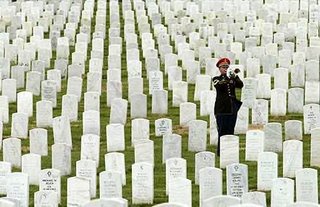 This past week, members of the administration went to Congress to ask for $65 billion more for a war that members of the administration once promised wouldn't cost a dime.
This past week, members of the administration went to Congress to ask for $65 billion more for a war that members of the administration once promised wouldn't cost a dime.I'm no whiz when it comes to finance, but I've never been off by three hundred billion dollars, not even that weekend I spent in Nogales with the twins.
To help you wrap your head around that big number, with three hundred billion dollars we could send every American kid under 18 to a private college for four years. Every kid.
Instead, we send 130,000 Americans into a sandblown hell to get their limbs blown off, every day, and it causes some of us to wonder, as a citizen asked before being hustled out of the room, "How many of you have children in this illegal and immoral war?"
I tried to find out how many members of Congress had sons or daughters in the military and, quel surprise, no one keeps those numbers. The best the Internets could give me was four or five. Maybe six, and that's counting sailors on ships in the Gulf.
This morning Susan Stamberg did a story on NPR about a collection of essays she found in a friend's library. (You knew we'd get around to books and writing sooner or later) The book was It Gives Me Great Pleasure by Emily Kimbrough, a writer for the New Yorker during WWII. Stamberg read part of an essay titled, The Evening Train.
In it, the author is on her way to speak to a group in Pennsylvania. She's picked up by the group's organizer who is in a hurry and says that the lecture must start on time tonight. The author doesn't ask why because, as the woman scoots around the mountain curves of central Pennsylvania, the driver "had a tendency to emphasize her vigorous conversation by pressing down on the accelerator."
Now I'm hooked. Here's a mystery. Why is it so important that the program begin on time?
The author gets to the hall, delivers her lecture and only then is she told the answer. The train is due, bringing home the boys from overseas. The dead boys.
To her credit, the author doesn't dwell on the dead or the families gathering at the station. She writes about hearing the train whistle:
"It whistled twice, one short and one long and thin, but heavy in the air. Several of us said simultaneously, 'It sounds like rain.' We smiled at one another with mutual kinship because we had all, in whatever town we had grown up, heard that kind of train whistle in the night, a whistle that lay heavy on the air and as children heard our elders say, "That means rain.'"
A woman remembers one of the boys coming home but the memory is in no way maudlin, just a thought of how the boy loved trains. The people wait. Their sacrifice is a shared sacrifice. They all knew that boy. They knew all of the boys on that train.
It was a different war in a different time. The sons of Congressmen were as likely to be in uniform as the sons of farmers and steel workers.
Today, we slap a magnetic ribbon on the back of our SUV and say we support the troops. But we don't know any. And when one comes home in the belly of a plane, the town doesn't pause for a moment of silence. No bells ring. It's just cargo and for most of us, there is no sacrifice. Even that 300 billion is borrowed from someone else. It's all plastic. It's someone else's money. It's someone else's misery. And I wonder how we got to this place, and I wonder how we can find our way out.
Hear the NPR story here. It's a beautiful piece.
1 comment:
I can't seem to post anything new to the site except in the comments, so this planet just got a little darker.
I don't know what's up, but will try again later.
Post a Comment